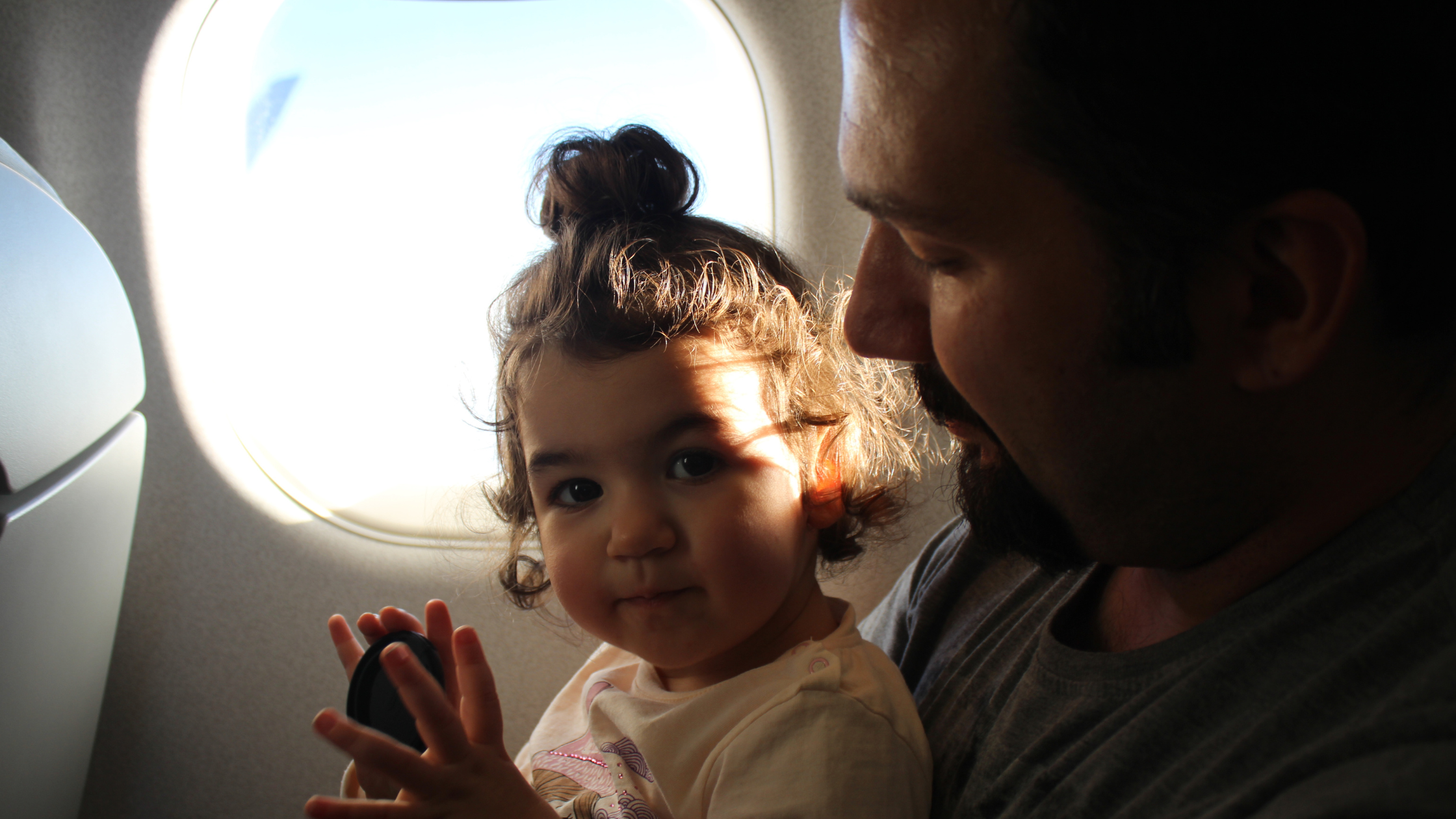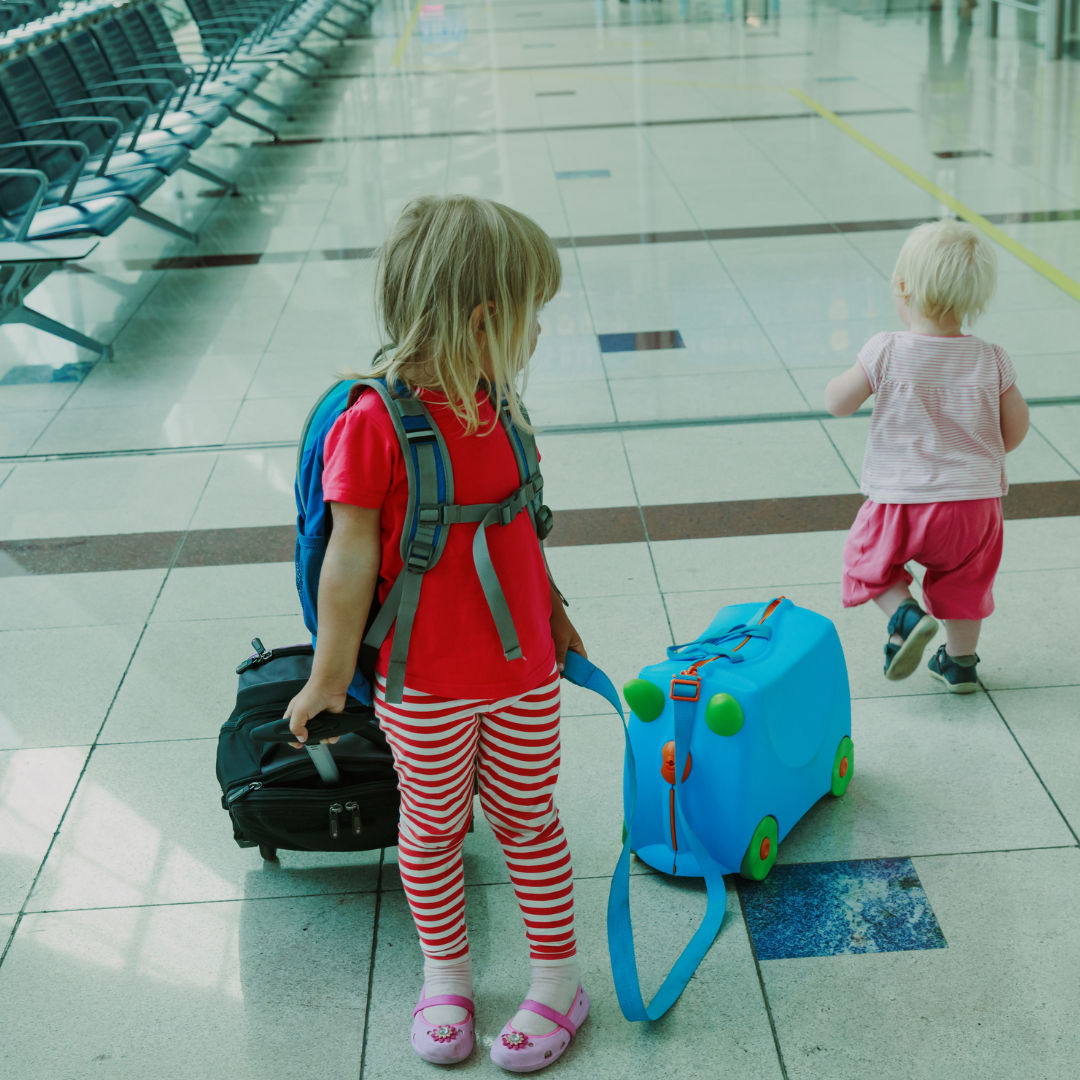Time Zone Travel, Jet Lag, & Kids: How to Survive Eastward, Westward, and International Travel with Babies & Kids
And yes, babies and children experience jet lag too.
Let’s talk about traveling across time zones with kiddos and how to make it as easy as possible on everyone.
Planning ahead for time zone travel
Be strategic about light exposure
We want to make the sleep space dark, like as close to pitch black as possible. You can get travel black out shades or even just tape black trash bags to the window. Either way, you’ll want to come prepared. When the room is extremely dark, your kiddo won’t be as confused or frightened by the new environment (because they can’t see it!) and it will also allow you to be strategic about when they are exposed to light and dark.
When you’re adjust to a new time zone, just remember that light in the morning shifts sleep earlier, while light in the evening shifts it later. So be careful and intentional about your kiddo’s light exposure.
Outsmart jet lag with biohacking
There are apps and websites that will level up your light exposure stragegy. They’ll also tell you how to avoid the danger zone (scientists call it the transition point) during which the effect of light reverses—so you could be royally screwing up their internal clock and making adjustment to the new time even harder if you accidentally turn on the lights at the wrong time. Yikes!
This free jet lag calculator gives tips on when to seek and avoid sunlight to help you adjust as quickly as possible to a new time zone.
There are also apps you can download for $10 or less, which you might prefer for convenience sake.
Prep the room
Your goal here is to make the new environment feel as much like home as possible. Travel shades, a white noise machine (or fan or white noise app, if that’s what you use at home), a comfort item or two, and a familiar blanket or set of sheets from home can make them feel more safe and secure, and even smell like home.
Anything goes on travel days - don’t try to plan for perfect nap schedules and bedtimes
Yep, they may skip naps, end up sleeping in your arms on the plane for the first time in a year, fall asleep watching a movie, eat 4 packs of those biscoff cookies for lunch, and decide that they don’t want to nap in the car on the way home from the airport to grandma’s house like you’d hoped they would. Oof.
But don’t sweat it. Travel makes things screwy but it’s OK. Your child will recover and the worst thing you can do for their sleep while you’re on the road is stress about it (guilty face over here — this is so much easier said than done). Just embrace the insanity. Travel is an awesome experience for your child, whether they sleep well or not. Your kiddo is so lucky to have parents with the resources and willingness to include them on adventures!
You can find some general tips for traveling with children in this blog from the holidays.
Embrace the new time zone
Once you arrive, aim to eat meals when other folks are eating meals and socialize as if you’re not jet lagged. It may be rough for a few days, depending on how far you’ve traveled, but doing this as much as is possible/reasonable, will help to speed up the process!
Consider schedule shifting ahead of time
If you’re traveling 5 or fewer hours time difference AND you have control over your child’s schedule (e.g. they don’t go to daycare) and your are good at following rules to a T, this might be for you. You really need to be the plan ahead type to make this work.
For example, if you’re traveling three hours to the west and want your child to be in great spirits for a 7PM rehearsal dinner in California Wine Country, and their bedtime at home is 7PM which is 4:00PM in Cali, you might start shifting their bedtime later by 15 each day for a week or two ahead of time. That way they’ll be able to stay up for the special dinner, and hopefully without falling apart due to overtiredness. No promise that they won’t fall apart for other reasons! And they will likely still stay up too late and be overtired to a degree. But the experience is worth it and everything will settle back into place when you get back home.
When doing the schedule shift ahead of time, it’s imperative that you move all meals and all naps, and keep their bedroom DARK 15 minutes later each subsequent morning. All of this will help to shift their internal clock forward. If you get their bedtime closer to 9:00PM on the East Coast, staying up for the 7:00PM
If you try this haphazardly, it can backfire by causing overtiredness before you even hit the road. So please only do the pre-travel schedule shift if you know you can do it right, and to a T.
Consider keeping your kiddo on their home time zone
This tends to work better when traveling West to East. If you’re traveling from California to say North Carolina, and bedtime is 7:00PM PST, you could consider keeping them up until 10:00PM EST. Some families love this, because it gets the kids onto a schedule that is much more in line with parental schedules (super helpful when sharing a hotel room or tiny AirBnb). This is harder to do traveling East to West because it’s tough to put a baby or child to sleep when it’s bright daylight outside (although, again, travel black out shades or black trash bags are your friend!). Plus, you probably don’t want to start every day of your trip at 3:00AM.
Start Your Journey of Stellar Sleep Today
Have a couple questions on how to survive your vacation and enjoy it at the same time?
Don’t want a full analysis just want quick tips and answers to your questions?
Our 1:1 Q&A has your answers
Specific Guidance for East to West Travel
Bedtime
If you’ve only crossed one or two time zones, try to keep your child awake until as close to the typical bedtime as possible. Maybe the excitement of arriving in a new location will help? If this proves impossible or your know your kiddo is really sensitive to overtiredness, try to keep them awake 30-60 minutes later each day, until they adjust—which should just take a couple of days.
The more time zone you cross, the harder it will be to keep your little one(s) awake until bedtime in the new time zone. Here’s an example for if you travel from the East Coast of the US to the West Coast, 3 time zones away. If your child usually falls asleep at 7:00PM Eastern, they’re body is going to be ready for bed at 4:00PM. Try to keep to keep them awake until at least 5:00 P.M. Late afternoon sun exposure will help! The next night, your goal should be 6:00, or maybe even 7:00PM. If your child is fairly adaptable, you could make a bigger jump right away. This tends to be more doable as kids get older.
Morning
Depending on how many time zones you’ve traveled, your child may think it’s time to start the day at 3:00 or 4:00AM (or maybe earlier). The key is to keep the lights extremely low and to keep the activity pretty boring. Bright lights and screens will encourage waking early again the next day. This would be a good time for snuggles, quietly chatting, or singing lullabies in the dark (maybe play pretend like you’ve gone back in time and there are no lights?), or letting them color by flash light while you try to sleep a little more, or read to them in really low lighting. Clearly this is harder with a baby, so just do your best. Try to hold off on feeding them as long as you can too. And definitely don’t turn on bright lights or instigate high energy activities until you’re closer tot he desired wake up time.
Naps
It’s going to be rough if you’ve traveled more than one or two time zones, but try to make it as close to the typical nap time as possible. But what if you crossed three time zones? If your baby usually wakes at 7:00AM and naps at 9:30AM, but woke up at 4:00AM on Day 1 in the new time zone, they’re going to have a hard time making it to 9:30AM for the first nap. Five and a half hours awake is A LOT for a baby who’s accustomed to just 2.5 hours awake before nap. Just get as close as you can. If you need an extra catnap in the late afternoon to get them to a more reasonable bedtime, that’s totally fine. But be careful about long naps in the late afternoon—their body may think it’s bedtime and have a hard time waking up! Make sure the extra nap, if they take one, is just a cat nap.
What if you travel three time zones with a toddler? If your toddler typically wakes up at 7:00AM and naps at 1:00PM when you’re at home, making it to even 11:00AM in the new time zone for the nap would be a victory! Let them nap as long as they want in an effort to get them acclimated to the later bedtime (because, remember, a 7:00PM bedtime on the West Coast is 10:00PM on the East Coast). If their nap isn’t very long and they fall asleep again later, wake them after 20 minutes or so to make sure they have enough sleep pressure at bedtime.
You may not hit the target nap time and bedtime on Day 1 or even Day 2, if you’ve traveled more than 2 or 3 time zones. Just keep moving in the right direction and you’ll get there.
Light Exposure
Spend time outdoors in the afternoon and early evening (although your kiddo may be toast by then, at least on Day 1 or 2 of the trip), in the bright sunlight if possible, and avoid the bright early morning sun. Keep the room as close to pitch black as possible to encourage them to sleep later.
Specific Guidance for West to East Travel
Bedtime
West to East travel is harder for all of is. It’s hard to will yourself to sleep earlier than what your internal clock is accustomed to. Staying up later in the new time zone, to keep you in line with your internal clock, isn’t a problem if you can sleep in the next day. But if you can’t, you’ve got some serious overtiredness on your hands. So you’ve got two options with your kiddos when you travel West to East.
#1 - Keep them on their home schedule and let them stay up later and sleep later. Keeping the bedroom dark will help to preserve their later wake up time. So if they usually wake up at 6:00AM, nap at noon and go to bed at 7:30PM, their new schedule will be a 9:00AM wake up, 3:00PM nap, and 10:30PM bedtime. This may or may not be acceptable to you!
#2 - Shift their schedule by trying to get them to fall asleep earlier than what their internal clock is expecting. This may be easier on the first day if they skipped nap(s) and are tuckered out from the travel. To help them settle earlier, spend 60+ minutes in a dimly lit environment before bedtime to help promote sleepiness and aim to get them to sleep 30-60 minutes earlier than when they’d be asleep at home. For this method to work, you’ll have to let light into their room and gently rouse them in the morning—i.e. don’t let them sleep in. If you let them sleep in, they’ll keep the later bedtime.
Morning waking
If you want your child to adapt to the new time zone (rather than just keeping them on their home schedule and hence later wake up, nap, and bedtimes), you can’t let them sleep in! Wake them at their usual time, or close to it. Provide lots of light exposure first thing after waking, preferably outside, and activity to aid in shifting the biological clock.
Naps
Your kiddo may not be tired at nap time because their internal clock isn’t accustomed to sleeping at that time. To help drive sleepiness, go for serious physical activity in the morning and lots of sunlight exposure as soon as they wake up. Lots of running, jumping, playing, swimming, and climbing will help to wear them out before nap.
Light Exposure
Seek out morning light and avoid bright light in the afternoon until they’ve adjusted to the new time zone.
A note for those of you traveling halfway around the world
I have the coolest, most wonderful clients, and am living vicariously through some of your travels this Summer—from the US to Europe, the Middle East, and Asia. So cool! If you’re making a big trek like this, you are a rockstar of a parent to bring along your children. Serious props to you! But yes, time zone travel of this magnitude can be extremely stressful, for even the most badass parents. So let’s break it down for those of you crossing lots of time zones.
The first thing you can do is just accept that it’s going to be rocky for a few days. We can’t change the fact that time zone travel causes jet lag. Also, your kids may or may not sleep when you travel and it’s OK. They are going to adjust to the new time zone. Sunrise, sunset, and social cues ensure it! But I’m going to be real here and tell you that I’ve never done this, so I’m pulling my guidance hear entirely from sleep science and zero from personal experience (I usually tap into a combo of the two). The most time zones I’ve crossed with my kiddos is three.
Since your child’s circadian rhythm is getting flipped upside down, they may wake up in the middle of the night because for their internal clock, it’s the middle of the day. All their sleep pressure has worn off since bedtime but there’s is no circadian drive keeping them asleep, or sleepy. When this happens, let them quietly play the dark or with as dim lighting as possible for an hour or two. The dim lighting (ideally zero lighting) and lack of rambunctious activity will help them build up sleep pressure again and hopefully be able to fall back asleep for a while. Fingers crossed for you this works! If it doesn’t, aim to keep them in dim lighting and low key activities until as close to morning as possible. They’ll begin to adjust! The natural light and social cues will help.
Try to synch up with the new time zone’s meal times.
Spend lots of time in the natural sunlight to help your internal clocks recalibrate to the new time zone.
Finally, use this Jet lag calculator (or use an app like Timeshifter) to tell you precisely when you should seek light, make it extremely dark, and aim to sleep. This calculator collects information about your flight, your current sleep schedule, and whether or not you want to start the shift before hand or when you get to your destination. You can biohack your way toward a speedy adjustment to the new time zone!
If your travels took you across many time zones, prepare yourself for the fact that it can take a day per time zone to acclimate back to the normal schedule. Hang in there and know that this period of less than stellar sleep is well worth the amazing experiences you are having as a family! These are memories that will last a lifetime and I promise you your kids won’t look back and say, “geez, I wish we hadn’t gone on that awesome trip because I got a little cranky overtired.” You’ll all sleep better once you get home and it will have been so worth it.
Happy Summer and safe travels!


